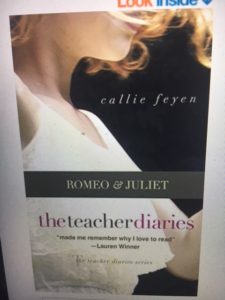 Laura’s note: Today we welcome Callie Feyen to the blog. Callie is a novelist, educator, and parent. She writes about what she learned from tracking time. Her new book, The Teacher Diaries: Romeo and Juliet, is out today so please go check that out.
Laura’s note: Today we welcome Callie Feyen to the blog. Callie is a novelist, educator, and parent. She writes about what she learned from tracking time. Her new book, The Teacher Diaries: Romeo and Juliet, is out today so please go check that out.
by Callie Feyen
My first planner was a slim, brown, Northwestern University 1989-1990 calendar that my dad brought home from work one evening. I was in 8th grade.
I was never a great student, but I was a lover of all things office supplies and organization, and I quickly sat down at my desk with my colorful pens and post-it notes and got to work writing down my friends’ birthdays, marking up the dates with hearts and smiley faces.
Soon though, I began jotting down things I’d done that day – what I wore; flute, dance, or gymnastic lessons; who I walked home with. It was the spring of the seventeen-year cicada, and I watched as they shoved themselves out of the dirt on warm evenings in May, ready to shed their skin and fly into adulthood. It was the year of my first school dance, titled “Rhythm Nation,” the name inspired by Janet Jackson’s 1989 album. My mom bought me a red Laura Ashley dress with flowers on it, and a giant bow to tie in the back, and my Aunt Lucy took it in at the top, assuring me that soon, she would unstitch what she’d sewn as I grew.
By the end of the summer, when I was beginning high school, I realized I’d collected a nice set of memories and had a record of what I’d done. There was something satisfying about seeing what I’d done during a confusing and unsure time. Marking up my planner helped me see I was doing OK during my first steps into the teenage years.
I think time-tracking is a good habit to keep, especially in times of uncertainty, or times when we are overwhelmed. Last fall, I responded to Laura’s invitation to track my time for a week. I turned my worksheets in, and Laura would look for ways I could use my time more efficiently.
It was a hectic time. We had just moved from Maryland to Michigan, my husband was starting a new job, my daughters were in a brand new school, and I decided to go back to full time teaching in downtown Detroit. Then, in December I signed a contract to write my first book.
I turned in timesheets that showed a 45-minute commute beginning at six in the morning, an hour or two of prep and grading, eight hours of teaching, then dinner prep, lunch making, and crashing into bed. I had no energy to write, let alone hold a conversation with anyone. I was hoping that Laura would look at my timesheets and shoot back an email saying, “Look! Here’s five hours right here,” and poof! I’d be a perfectly organized teacher, prolific writer, and all around wonderful mother.
However, after looking at my time tracker, Laura confirmed how busy my schedule was. She didn’t say I wasn’t capable of writing a book, or teaching, or being a mother, and I think that’s an important distinction to make: it’s not a matter of whether we are able to do “all the things.” It’s a matter of whether we can or should do them all at once. I was having a difficult time understanding this. I believed my lack of time was a result of a character flaw on my part. I was too lazy, too unorganized, and not smart enough to figure this out. Laura helped me see that this was not the case. I was, in fact, capable, but I needed to make some tough decisions about where to focus my energy.
I quit my teaching job mid-year. A couple months later, I began working as an At-Risk Literacy Specialist in two neighborhood schools. It’s an hourly job, not quite full-time, but allows me to keep my hand in teaching without bringing work home, freeing me up to write in the mornings.
It was not a risk-free move. I took a pay cut, and I went from teaching Language Arts for middle school students — my specialty — to working with kindergarteners and first graders on early literacy skills, something I had very little experience with (unless you count reading to my daughters every night). Plus, I  took the job so I could write my book, not knowing what effort that would take.
took the job so I could write my book, not knowing what effort that would take.
In fact, I didn’t even write the book I set out to write. A different story grew, one that took me back to my own growing up years, and one that showed me the importance of keeping those memories of middle school. The Teacher Diaries: Romeo and Juliet is the first in a series about showing young adults the joys of literature and will be released this Valentine’s Day. Evaluating my schedule and changing jobs gave me the space to think about why I love teaching, especially middle school.
Just like my little brown planner from the early nineties allowed me to see my life on the page and take note of what was going on during those growing pangs, tracking time gave me a chance to take stock of my days in a non-judgmental, curious manner and see where I could go from there. It was not easy work. It was perhaps similar to a seventeen-year cicada waiting for the soil to warm so it could push forward into adulthood, but I am thankful that I learned to use new wings.

What a wonderful post! I’d love to hear more stories about what people have learned from time tracking.
@Linda M – so glad you liked it. One of the most fun things about writing about time is seeing what people discover through time-tracking. Some people make really big changes, which is always fascinating to see!
Wonderful post about a really interesting person. Thank you for sharing!
@Omdg – agreed that Callie is awesome!
I loved this post and was particularly struck by this line: “I think time-tracking is a good habit to keep, especially in times of uncertainty, or times when we are overwhelmed.” I had thought of time-tracking as a time management tool, never as a way of anchoring oneself psychologically.
@Louisa- I definitely think time-tracking is good for life management in general, not just time management. Whenever we’re figuring things out, it’s helpful to know where our attention is really going.